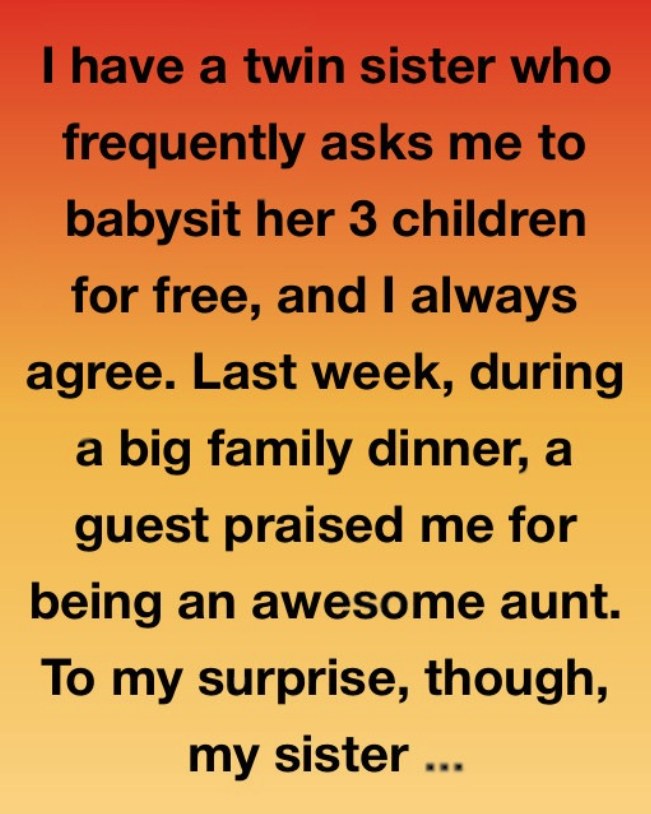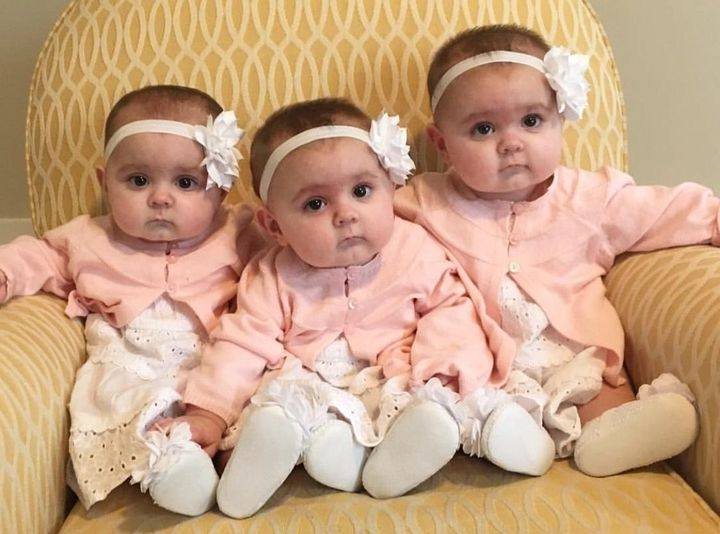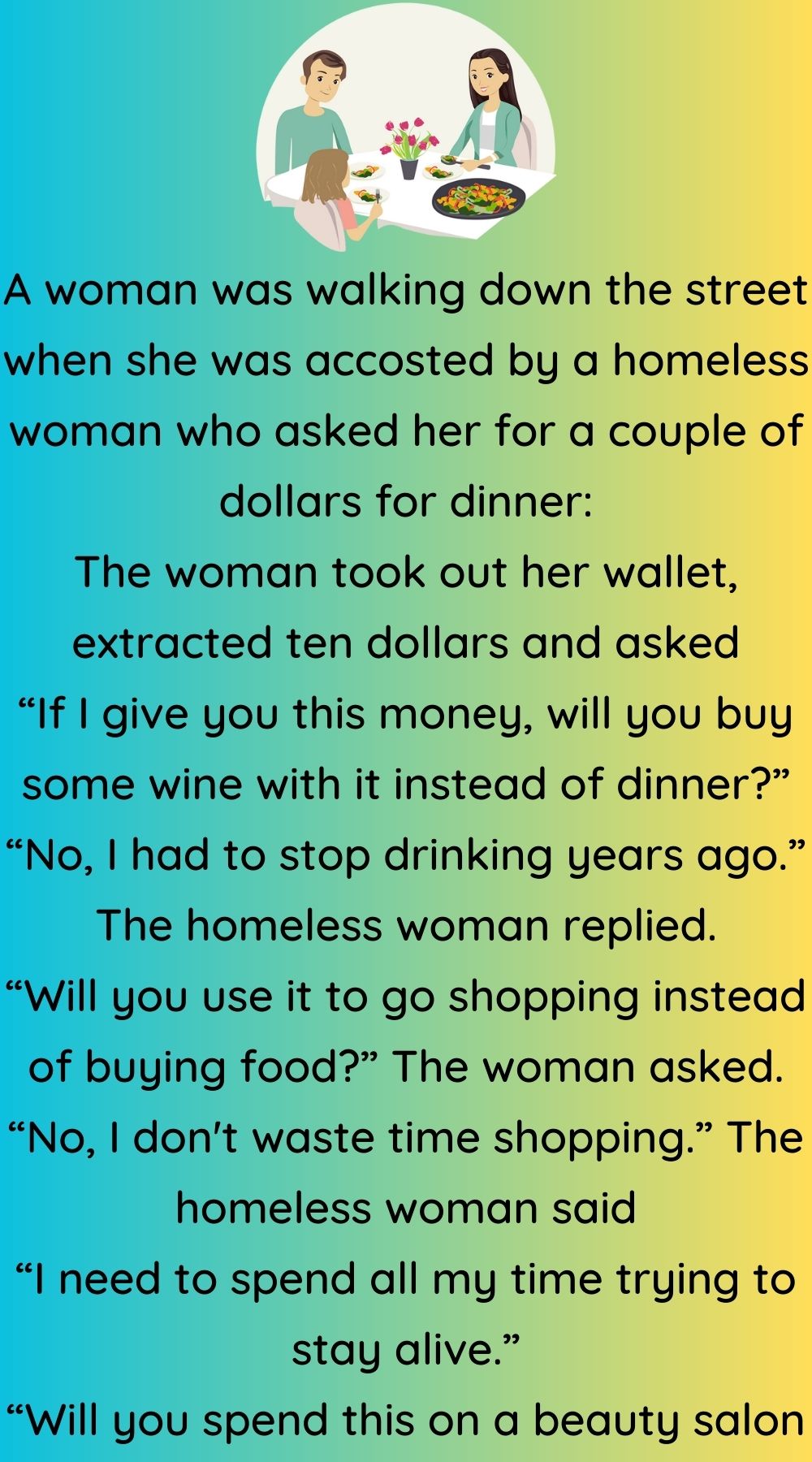I’ve always believed that family means showing up — especially when it’s not convenient. But sometimes, showing up too often can make others forget that you have your own life, too.
This story is about me, my twin sister Rea, and how one small moment at a family dinner changed the way we saw each other — and ourselves. It’s a story about love, boundaries, forgiveness, and the quiet strength that comes from learning to say no when you’ve spent years always saying yes.
Always the Helper
Being a twin is special. From childhood, Rea and I shared almost everything — clothes, secrets, inside jokes, even the same teachers who could never tell us apart. We had the kind of connection that made people say, “You two must read each other’s minds.”
But as adults, our paths split in very different directions. Rea married young and had three beautiful children. I, on the other hand, focused on my career and built a small, peaceful life of my own. Yet despite our differences, our bond remained strong — or so I thought.
Rea often asked me to watch her kids, and I always said yes. Whether it was a last-minute meeting, a night out, or a simple errand, she knew she could call me, and I’d be there. I adored my nieces and nephew. Their laughter filled my quiet home with joy, and their hugs always made the long workdays worth it.
I never thought of it as a burden — it was family. That’s what family does, right?
Still, over time, the requests became routine. What started as occasional help turned into an unspoken expectation. I rearranged my work schedule, skipped social events, and even turned down weekend getaways. I didn’t mind much at first; it felt natural to help. But as months passed, I started realizing how much of my own life revolved around hers.
The Comment That Changed Everything
It happened during a big family dinner one Saturday night — one of those gatherings where laughter fills the air, the kids run around with crayons, and the smell of roasted garlic and fresh bread makes the whole house feel warm.
Someone at the table — I think it was my cousin’s friend — looked at me and said, “You’re such a great aunt! Always with the kids, always helping out.”
I smiled, a little embarrassed but proud. Before I could respond, Rea laughed and said, “Oh, please! She only watches them when I have no one else. She’s always complaining about it!”
The room went quiet. My fork hovered in midair.
Our mom raised an eyebrow. Dad stopped chewing. Even my quiet younger cousin looked up from his phone.
Rea kept laughing, oblivious to the awkward silence she’d just created.
I forced a smile. “Right,” I said softly, pretending it was all just a silly misunderstanding.
But inside, something cracked.
When Kindness Feels Invisible
That night, after everyone left, I stayed to help Mom clean up the dishes. Rea chatted with our aunts, completely unaware of how her words had landed.
On the drive home, I replayed that moment over and over. I wasn’t angry, exactly — more… sad.
For years, I’d been there for her. Not because I had to, but because I wanted to. I’d left work early, canceled dates, skipped weekends away, and built my schedule around hers. I thought I was being a good sister.
So hearing her dismiss it all, like my help was an afterthought — that stung deeply.
Still, I told myself it didn’t matter. Maybe she didn’t mean it that way. Maybe it came out wrong. I tried to brush it off.
But she didn’t call or text afterward. No apology. No acknowledgment. Nothing.
The First “No”
That Friday, my phone buzzed with her name.
“Hey!” her message read. “Can you watch the kids tomorrow? I’ve got that spa appointment I told you about. Pleeease!”
Normally, I’d say yes without hesitation.
But that night, my fingers hovered over the screen before typing, I can’t tomorrow, sorry.
I hit send.
She replied with a sad emoji and said, “Okay, I’ll figure something out.”
And just like that, something inside me felt lighter. For once, I didn’t feel guilty. I felt free.
That weekend, instead of babysitting, I met friends for brunch. We laughed too loudly, shared pancakes, and wandered through a local market filled with handmade crafts and fresh flowers. I’d forgotten what it felt like to do something purely for myself.
For the first time in a long while, I wasn’t the sister who always said yes. I was just me.
Clarity, Not Guilt
By Monday, Rea texted again — this time, not as cheerful.
She’d taken the kids to the spa because she couldn’t find anyone else, and apparently, it had been a disaster.
“They knocked over a candle display,” she wrote. “I had to pay for damages. You could’ve just helped.”
I read her message and waited for the familiar wave of guilt to wash over me. But it didn’t come.
Instead, I felt clarity.
For years, I’d been helping out of love, but Rea had come to expect it — not appreciate it. She wasn’t asking for help anymore; she was assuming it.
That’s when I decided it was time to talk.
The Conversation That Changed Everything
I invited her for coffee that Tuesday. We met at a cozy café near our old high school — a place filled with memories of late-night study sessions and laughter.
She arrived ten minutes late, juggling a juice box and her youngest’s backpack. Her hair was messy, and she looked tired.
“Hey,” I greeted her gently.
“Hey,” she said, sitting down and exhaling. “So… what’s up?”
I took a deep breath. “I wanted to talk about dinner the other night.”
She frowned. “What about it?”
I told her the truth — how her comment had hurt me, how it made me feel small and unappreciated. I said I didn’t expect praise, but I also didn’t deserve to be mocked.
“I love your kids,” I said. “You know that. But I also have a life. And I need you to see that — to see me.”
She stared at her coffee, stirring it slowly. Then she whispered, “I didn’t even realize I said that. I was just joking.”
“Yeah,” I replied, “but no one else knew it was a joke. And you never apologized.”
She looked up at me, eyes softening. “You’re right. I’ve taken advantage of you. I’m sorry.”
It wasn’t dramatic. There were no tears. But those simple words lifted a weight I didn’t realize I’d been carrying.
A New Kind of Balance
After that talk, things began to shift.
Rea stopped assuming I was available. She started asking — really asking. Sometimes I said yes, sometimes no, and she respected both answers.
It was a quiet change, but a meaningful one.
Then, about a month later, life tested that new balance.
When Life Demands Grace
One rainy evening, Rea was in a minor car accident. Thankfully, she wasn’t seriously hurt — just a sprained wrist and a few bruises. But she couldn’t drive or use her right hand for a while, and suddenly, she needed help again.
At first, I stepped in the way I always had — cooking dinner, picking up the kids, running errands. But this time, something was different.
Rea said thank you. Every single time.
Not a rushed, half-distracted “thanks,” but genuine gratitude. She saw what I was doing — really saw it — and it changed everything between us.
One evening, after I helped the kids finish their homework, she pulled me aside.
“I’ve been thinking about everything you’ve done for me,” she said quietly. “Not just now, but for years. I don’t think I ever said it properly.”
I smiled. “You’re saying it now.”
She shook her head. “No, I mean it. I’ve applied for a part-time nanny through the church. Just for a few hours a week. You deserve time for yourself.”
That moment hit me hard — not with sadness this time, but warmth. She wasn’t just apologizing. She was changing.
Rebuilding Sisterhood
Over the next few months, we found a rhythm that worked for both of us.
We met for coffee on weekends, took walks with the kids, and even planned grocery runs together. Our relationship stopped being one-sided.
It wasn’t about helping or owing. It was about connection.
Then, one evening, everything shifted again — not in a painful way, but in a way that reminded us both of what truly matters.
Family, Tested Again
Late one night, Rea called, her voice trembling. “Dad fell in the backyard,” she said. “He’s hurt. I’m on my way to his house.”
We rushed there together. Dad had tripped over a garden hose and injured his hip. The ambulance arrived, and we followed it to the hospital. Those next few hours waiting for news felt like forever.
Sitting in that quiet waiting room, surrounded by vending machines and dim lights, Rea turned to me and whispered, “I don’t know how I’d get through this without you.”
I leaned my head on her shoulder. “You don’t have to. We’re in this together — always have been.”
Thankfully, Dad recovered well. The scare brought us all closer. Even the kids seemed to sense the importance of family. One day, the youngest, Mavi, handed me a drawing that said “Best Aunt Ever,” with stick figures of all of us holding hands.
I hung it on my fridge, where it still sits today.
A Gift of Love
Six months later, on a quiet Friday evening, I came home from work to find Rea waiting at my door. She held a small gift bag, her smile shy but excited.
“What’s this?” I asked.
“Open it,” she said.
Inside was a card that read:
To my sister, my best friend, and the best aunt — thank you for everything. You deserve the world… and maybe a little break too.
Tucked inside the envelope was a plane ticket.
To Italy.
One week. Paid for.
“I’ve been saving up,” she said, her eyes bright. “And I already found someone to watch the kids. I want you to go. No excuses.”
Tears filled my eyes. “Rea, I don’t even know what to say.”
She hugged me tightly. “You don’t have to say anything. Just go live a little — for you this time.”
Rediscovering Myself
That trip to Italy changed me.
It wasn’t just about the breathtaking views of Venice or the taste of freshly made pasta — though those were unforgettable. It was about rediscovering who I was outside of everyone else’s needs.
For years, I’d been someone’s helper, someone’s backup, someone’s second plan. But walking through cobblestone streets alone, hearing the hum of a foreign language around me, I remembered what freedom and self-love felt like.
I came back lighter. Calmer. Happier.
And when I did, Rea welcomed me home with flowers and dinner waiting. True to her word, she didn’t fall back into old habits. She asked before asking for help. She offered help when I needed it.
We’d found something rare — balance.
When a Small Crack Lets the Light In
Looking back now, I see that everything changed because of that one careless comment at dinner.
It hurt — but it also opened a door. Sometimes, a small crack is what lets the light in.
Not every story ends with apologies or grand gestures. But when love replaces pride, and accountability replaces assumption, healing has room to grow.
If you’ve ever felt unseen or taken for granted, I understand. It takes courage to speak up — to say, “This hurts” or “I need to be seen.” But sometimes, that moment of honesty becomes the beginning of something beautiful.
And if you’ve been on the other side — the one who didn’t notice, who forgot to say thank you — it’s never too late to make it right.
A simple “I’m sorry” can heal more than you realize.
The Real Gift
In the end, the greatest gift my sister ever gave me wasn’t the plane ticket or the vacation. It was something deeper — the acknowledgment that my time, effort, and love mattered.
That’s the beauty of family. We stumble, we misunderstand, we forget — but we also learn, forgive, and grow.
Today, Rea and I laugh about that dinner table moment. It’s become part of our story — a reminder that even the most painful experiences can bring people closer if handled with honesty and love.
So if you’re reading this and feeling unseen, please remember: speaking your truth isn’t selfish. It’s necessary.
And if you’ve been leaning too hard on someone else without realizing it — reach out. Say thank you. Say sorry. Say I see you.
Because the real gift isn’t the help we give or receive. It’s the understanding that love — when appreciated — grows stronger on both sides.
Thank you for reading.
If this story touched your heart, share it with someone you care about. You never know whose life it might change — or whose heart it might open.



